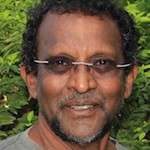Mega Mess

In a nation whose environment was once clean and benign, we have now begun to suffer the wages of a Government appointed to protect the health and well being, letting destructive development become the state norm. The trend in public health deterioration is so acute that at a recent medical meeting on the subject, Prof Oliver A. Ileperuma stated that 45% of hospital admissions are for respiratory disorders. The quality of air in the city is degrading and the levels of airborne particulate matter are on the increase. Why the negligence? Do we not have laws to protect the health of the public? Do we not have laws that seek to protect the well being of our citizens? Does not the GoSL have a responsibility to protect our health? The unfolding tragedy of the air quality of Kandy town is a case in point; surrounded by hills, the city develops an ‘inversion layer’ of heavy, polluted air that does not easily escape due to these physical barriers to air movement. Thus the citizens of Kandy face the specter of increasing rates of respiratory disorders for themselves and their children. The air pollution problem of Kandy is magnified by its geographical situation, but it need not be, with no physical barriers to airflow, it had a much better quality of air than Kandy. But ‘Urban Development’ today seems to refer to built environment and infrastructure, to mega constructions, with no heed to the impact on health and well being of the citizens. Why do government institutions act against the interest of the citizens that they are supposed to serve?
A glaring example is the shady deals and conflicts of interest around the ‘Port City’ project can be seen by the The Executive Summary of the December 2015 Supplementary Environmental Impact Assessment for the Colombo Port City. It demonstrates a disturbing and troublesome conflict of interest issue for the GoSL.
The guiding principles for its formulation the SEIA states:
“(b) The Terms of the Agreement entered into between the Ministry of Ports and Shipping, acting on behalf of the Government of Sri Lanka (GOSL), and CHEC Port City Colombo (Pvt) Ltd (the Project Company), … stipulates inter alia that the Sri Lanka Ports Authority (SLPA)/GOSL is responsible for securing the required environmental permits and approvals.”
Such an undertaking by the GoSL can be seen to be in direct violation of its responsibilities under Article 27 subsection 14:
“The State shall protect, preserve and improve the environment for the benefit of the community.” It means that the Government of Sri Lanka agrees to get all the approvals that Parliament has set up to protect its citizens and preserve their rights. If so, who is watching after the rights of the citizens of this nation? Most certainly, not the government!
This maybe compared to the Environmental and Social Framework of the Asian Infrastructure Investment Bank Annex Environmental and Social Policy: the onus is placed squarely on the Project Proponent:
67. Roles and Responsibilities of the Client. The Client: (a) assesses the Project and its environmental and social risks and impacts; (b) prepares the Project’s environmental and social documentation, in accordance with the ESP and ESSs; and (c) engages with people affected by the Project and other stakeholders, through information disclosure, and meaningful consultation in accordance with the ESP and ESSs. The Client furnishes all required information, including executive summaries and reports on the environmental and social assessment, all of the Project’s required environmental and social documentation, and monitoring reports, to the Bank for review.
68. The Client is responsible for complying with its environmental and social obligations under the Project in accordance with the legal agreements with the Bank governing the Project. To ensure that contractors appropriately implement the agreed measures, the Client includes the relevant environmental and social requirements in the tendering documents and contracts for goods and services required for the Project.
The activities of the promoters of the project, demonstrates a connivance that is not in the national interest and goes against the rules of both the Government of Sri Lanka and the Bank who is supposed to finance the deal. Supplementary Environmental Impact Assessments (SEIA’s) are being issued to cover any aspect of their crookedness, as it surfaces. This allows them to skirt national laws and genuine concerns that citizens have of impacts on their well-being.
In yet another SEIA for the Colombo Port City the Sri Lanka Land and Reclamation Development Corporation, titled Off Shore Sea Sand Extraction Project at Kerawalapitiya, the SLLRDC states that they have been requested by the Ministry of Megapolis and Western Development to supply 40 million cubic meters of sand over three years from a reservation previously earmarked to supply up to 4 million cubic meters annually over 15 years. The environmental and social impact of this action goes unchallenged, where are the state watchdogs who are supposed to check, such excesses?

